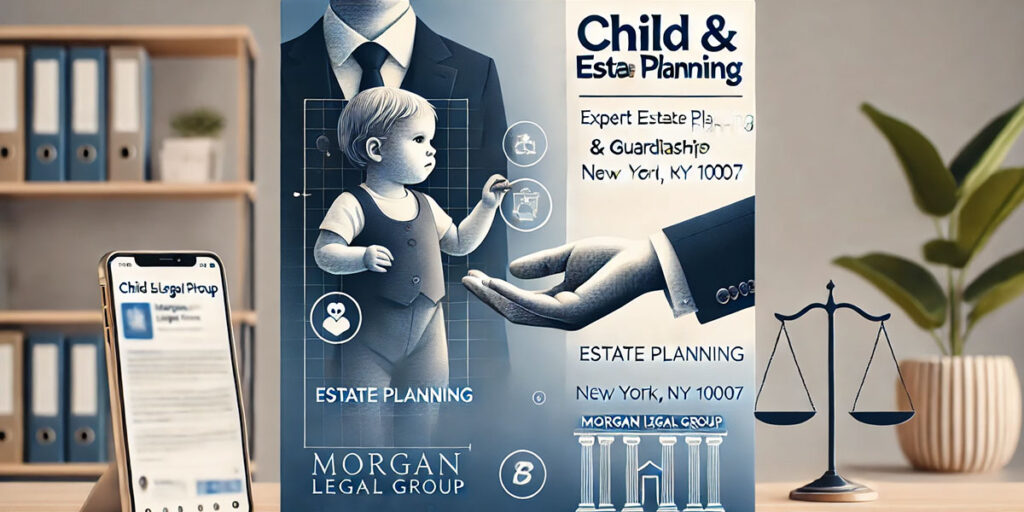Protecting Your Children’s Future: Child and Estate Planning in New York
As a parent, securing your children’s future is paramount. This extends beyond providing love and care during your lifetime. It also includes comprehensive estate planning to ensure their well-being and financial security in the event of incapacity or death. Specific legal tools and strategies are available in New York to safeguard your children’s future. We at Morgan Legal Group understand the unique needs of families and offer expert guidance in creating estate plans that provide for your children’s long-term care and financial stability. We can help you navigate the complexities of guardianship, trusts, and wills to ensure your children are protected.
Why Child-Focused Estate Planning is Essential
Estate planning for families with children differs significantly from estate planning for individuals or couples without children. The needs of minors or young adults require special consideration, particularly regarding guardianship, financial management, and long-term care. A well-designed estate plan can address these unique needs and provide peace of mind, knowing your children will be cared for.
Guardianship: Choosing Who Will Raise Your Children
One of the most critical aspects of estate planning for parents is designating a guardian for their minor children. This person will assume responsibility for the child’s care, upbringing, and well-being if both parents are unable to do so. Choosing a guardian is a deeply personal decision that requires careful consideration. Factors to consider include the guardian’s values, lifestyle, financial stability, and relationship with your children. Under New York law, you can nominate a guardian by will.
Financial Security: Providing for Their Needs
Estate planning also involves ensuring your children have the financial resources they need to thrive. This may involve establishing trusts to manage and distribute assets for their benefit. Trusts can provide for their education, healthcare, and general living expenses. You can also designate beneficiaries for life insurance policies and retirement accounts. These will provide additional financial support. Morgan Legal Group can help you structure your assets to maximize their benefit for your children.
Avoiding Family Disputes
A comprehensive estate plan can also help avoid potential family disputes regarding your children’s care and inheritance. By clearly outlining your wishes in a legally binding document, you can minimize the risk of disagreements and ensure that your children are protected from unnecessary conflict. Clear communication is crucial for preventing later problems.
Key Components of a Child-Focused Estate Plan in New York
A comprehensive estate plan for families with children typically includes the following key components:
Last Will and Testament
A will is a fundamental estate planning document that allows you to designate a guardian for your minor children, specify how your assets will be distributed, and name an executor to administer your estate. A will must meet specific legal requirements in New York to be valid. These include being in writing, signed by the testator (the person making the will), and witnessed by two individuals. Without a will, the court will decide who raises your children and how your assets are distributed according to New York’s intestacy laws. Also, wills allow you to nominate an executor, the person who will manage your estate.
Guardianship Designation
As mentioned earlier, designating a guardian for your minor children is crucial. In your will, you can nominate the person or persons you wish to serve as guardian in the event of your death or incapacity. The court will generally honor your wishes unless there is a compelling reason not to do so. It’s also important to name alternate guardians in case your first choice can or unwillingly serve. Nomination ensures that *your* choice of guardian will be considered.
Trusts for Minors
Trusts are legal arrangements that allow you to hold and manage assets for the benefit of your children. Various types of trusts can be used in estate planning, each with its own advantages and disadvantages. Some common types of trusts for minors include:
- Revocable Living Trusts: These trusts allow you to retain control over your assets during your lifetime while ensuring that they pass to your beneficiaries (your children) without going through probate. You can also name a trustee to manage the trust assets on behalf of your children.
- Irrevocable Trusts: These trusts offer tax advantages and asset protection. However, they are more restrictive than revocable trusts. Once assets are transferred to an irrevocable trust, they generally cannot be taken back.
- Testamentary Trusts: These trusts are created in your will and come into effect upon your death. They can be useful for managing assets for minor children until they reach a certain age.
- 2503(c) Trusts: These are specific types of trusts designed to qualify for the annual gift tax exclusion.
Trusts can provide flexibility in managing and distributing assets to your children. For example, you can specify that the trustee uses the funds for education, healthcare, or other specific purposes. A trustee manages the assets according to your instructions.
Life Insurance
Life insurance can provide a valuable source of financial support for your children in the event of your death. You can designate your children as beneficiaries of your life insurance policy. Alternatively, you can create a trust to receive the life insurance proceeds and manage them for your children’s benefit. Life insurance proceeds are generally income tax-free.
Healthcare Proxy and Living Will
These documents allow you to appoint someone to make healthcare decisions on your behalf if you are unable to do so yourself. While these documents are primarily for your own benefit, they can also indirectly benefit your children by ensuring that your healthcare wishes are respected. These documents are often overlooked, but are important parts of a good estate plan.
Durable Power of Attorney
A durable power of attorney allows you to appoint someone to manage your financial affairs if you become incapacitated. This can be useful for ensuring that your bills are paid and your assets are adequately managed if you are unable to do so yourself. A durable power of attorney is crucial for incapacity planning.
Choosing a Guardian: Key Considerations
Selecting a guardian for your children is one of the most important decisions you will make as a parent. It’s essential to choose someone who shares your values and will provide a loving and supportive environment for your children. Here are some key considerations when choosing a guardian:
Relationship with Your Children
Choose someone who has a close and loving relationship with your children. This will make the transition easier for your children in the event that you are no longer able to care for them. A strong existing bond can ease the transition.
Values and Lifestyle
Consider the guardian’s values and lifestyle and whether they align with your own. You want to choose someone who will raise your children in a manner that is consistent with your beliefs. Similar values are critical for consistency.
Financial Stability
Choose someone who is financially stable and able to provide for your children’s basic needs. While your estate can provide financial support, it’s important to choose a guardian who is responsible with money. They should be capable of managing their own finances effectively.
Age and Health
Consider the guardian’s age and health and whether they will be able to care for your children long-term. You want to choose someone who is likely to be able to provide care and support for your children until they reach adulthood. Long-term stability is essential for your children.
Location
Consider the guardian’s location and whether you are comfortable with your children moving to that location. Moving can be disruptive for children, so it’s important to consider the impact on their lives. Minimize disruption when possible.
Willingness to Serve
Most importantly, make sure the person you choose is willing to serve as guardian. Have an open and honest conversation with them about the responsibilities involved. Ensure they are prepared to take on this important role. Open communication is key before making a decision.
Trust Planning for Children: A Detailed Look
Trusts are powerful tools for managing assets for the benefit of your children. They offer flexibility and control over how the assets are used and distributed. Here’s a more detailed look at some of the trust options available in New York:
Revocable Living Trusts (Explained)
Revocable living trusts are created during your lifetime and can be changed or revoked at any time. They allow you to transfer ownership of your assets to the trust. You can serve as the trustee, managing the assets yourself. Upon your death or incapacity, a successor trustee will take over management of the trust. The assets will be distributed to your beneficiaries (your children) according to your instructions. Avoiding probate is a major advantage of a revocable living trust. It streamlines the transfer of assets to your heirs. Assets in the trust pass outside of probate.
Irrevocable Trusts (Explained)
Irrevocable trusts are more permanent than revocable trusts. Once assets are transferred to an irrevocable trust, they generally cannot be taken back. Irrevocable trusts can offer significant tax advantages. These also protect assets from creditors. However, they provide less flexibility than revocable trusts. Decide whether the benefits outweigh the restriction of access.
Testamentary Trusts (Explained)
Testamentary trusts are created in your will and come into effect upon your death. They can be useful for managing assets for minor children until they reach a certain age. You can specify the terms of the trust in your will. You also must name a trustee to manage the assets on behalf of your children. A testamentary trust only goes into effect after your death.
Special Needs Trusts (Supplemental Needs Trusts)
If you have a child with special needs, a special needs trust (also known as a supplemental needs trust) can be an invaluable tool. These trusts allow you to provide for your child’s needs without jeopardizing their eligibility for government benefits. They can pay for expenses not covered by government programs, such as therapy, recreation, and specialized care. Special Needs Trusts must be carefully drafted to comply with federal and state regulations.
Selecting a Trustee
Choosing the right trustee is crucial for the success of any trust. The trustee is responsible for managing the trust assets, making distributions to your children, and ensuring that the trust terms are followed. Choose someone who is trustworthy, responsible, and financially savvy. Family members, friends, or professional trustees can serve in this role. Select the option that best fits your particular family.
Life Insurance and Estate Planning for Children
Life insurance is an important component of estate planning for families with children. It can provide a valuable source of financial support in the event of your death. Here’s how life insurance can be used to benefit your children:
Providing Financial Support
Life insurance proceeds can be used to cover your children’s living expenses, education costs, and other financial needs. The proceeds can help replace your income and provide a safety net for your family. The amount of life insurance you need will depend on your individual circumstances. It depends on your income, debts, and financial obligations.
Funding a Trust
You can designate a trust as the beneficiary of your life insurance policy. The life insurance proceeds will be paid directly into the trust. Then, the trustee will manage the funds for your children’s benefit according to the trust terms. This can provide professional management of the funds. It ensures they are used wisely for your children’s needs.
Paying Estate Taxes
Life insurance can also be used to pay estate taxes. This prevents your heirs from having to sell assets to cover the tax burden. This is particularly important for large estates. Life insurance helps preserve family wealth.
Types of Life Insurance
There are two main types of life insurance: term life insurance and permanent life insurance. Term life insurance provides coverage for a specific period of time. Permanent life insurance provides lifelong coverage and also accumulates cash value. The best type of life insurance for you will depend on your individual needs and financial goals. Consult with a financial advisor for customized advice.
Navigating Guardianship Proceedings in New York
If you die without designating a guardian for your minor children, or if the designated guardian is unable or unwilling to serve, the court will appoint a guardian. This process is known as a guardianship proceeding. Here’s what you need to know about guardianship proceedings in New York:
Who Can Petition for Guardianship?
Any interested party can petition the court for guardianship of a minor child. This may include relatives, friends, or even social service agencies. The court will prioritize the child’s best interests when determining who should serve as guardian.
The Court’s Role
The court will conduct an investigation to determine who is best suited to serve as guardian. This may involve interviewing the child, the parents (if living), and other interested parties. The court will also consider the child’s wishes, if they are old enough to express them. The paramount consideration is always the child’s best interests.
Types of Guardianship
There are two main types of guardianship: guardianship of the person and guardianship of the property. Guardianship of the person involves making decisions about the child’s care, custody, and upbringing. Guardianship of the property involves managing the child’s assets and finances. One person can serve as both guardian of the person and guardian of the property, or different people can be appointed to each role.
Challenging a Guardianship
If you disagree with the court’s decision regarding guardianship, you have the right to challenge the decision. You can appeal the court’s order to a higher court. An attorney can advise you on your rights and options. An experienced attorney can guide you through the legal process.
Estate Planning for Unmarried Parents in New York
Estate planning is particularly important for unmarried parents. Clear legal documentation is essential to protect their children’s rights and ensure their well-being. Here are some key considerations for unmarried parents in New York:
Establishing Paternity
If you are an unmarried father, it’s essential to legally establish paternity. This can be done by signing an acknowledgment of paternity or by obtaining a court order. Establishing paternity gives you legal rights and responsibilities as a parent. It ensures your child can inherit from you.
Guardianship Designations
Unmarried parents should designate guardians for their children in their wills. Without a clear designation, there could be disputes about who should care for the children if something happens to one parent. Designating a guardian is especially important for unmarried parents.
Co-Parenting Agreements
Consider creating a co-parenting agreement with the other parent. This outlines your respective rights and responsibilities regarding your children’s care. It addresses issues such as custody, visitation, and decision-making. A co-parenting agreement can help avoid disagreements and provide stability for your children.
Trust Planning
Trusts can be particularly useful for unmarried parents. They allow you to manage assets for your children’s benefit and ensure they are used wisely. You can name a trustee to manage the assets on behalf of your children. You can ensure that your children’s needs are met, regardless of your relationship with the other parent. Choose a responsible trustee.
Updating Your Estate Plan: A Continuous Process
Estate planning is not a one-time event. It’s an ongoing process that should be reviewed and updated periodically to reflect changes in your life circumstances, such as marriage, divorce, birth of a child, or changes in your financial situation. Here are some reasons why you should update your estate plan regularly:
Changes in Family Circumstances
If you get married, divorced, or have a child, you should update your estate plan to reflect these changes. You may need to change your beneficiary designations, designate a new guardian for your children, or create new trusts. Family changes require estate plan updates.
Changes in Financial Situation
If your financial situation changes significantly, you should update your estate plan to ensure that your assets are properly managed and distributed. For example, if you acquire new assets, you may need to create new trusts to protect them. Financial changes necessitate estate plan review.
Changes in the Law
Estate tax laws and other relevant laws can change over time. You should review your estate plan periodically to ensure that it complies with current law. An attorney can advise you on any necessary updates. Legal changes demand professional review.
Reviewing Your Documents
At a minimum, you should review your estate planning documents every few years to ensure that they still reflect your wishes. You may also want to review your documents if you move to a different state, as estate laws vary from state to state. Regular reviews guarantee alignment with your wishes.
Common Mistakes to Avoid in Child and Estate Planning
Many people make common mistakes when planning their estates, especially when children are involved. Avoiding these mistakes can save your family time, money, and stress. Here are some common errors to watch out for:
Failing to Designate a Guardian
One of the biggest mistakes parents make is failing to designate a guardian for their minor children. This can leave your children’s future uncertain and create conflict among family members. Always designate a guardian.
Not Creating a Trust
Many people fail to create trusts to manage assets for their children’s benefit. Trusts can provide professional management of the assets and ensure that they are used wisely. Consider creating appropriate trusts.
Not Updating Beneficiary Designations
It’s important to update your beneficiary designations on life insurance policies, retirement accounts, and other assets to reflect your current wishes. Outdated beneficiary designations can lead to unintended consequences. Review and update beneficiaries regularly.
Not Considering Special Needs
If you have a child with special needs, it’s crucial to create a special needs trust to protect their eligibility for government benefits. Standard estate planning may jeopardize benefits.
Delaying Estate Planning
Many people delay estate planning, thinking they have plenty of time. However, it’s important to plan early to protect your children and ensure that your wishes are carried out. Don’t delay estate planning. It’s an act of love.
Why Choose Morgan Legal Group for Your Child and Estate Planning Needs?
When it comes to child and estate planning in New York, you need an experienced and knowledgeable attorney who can guide you through the process and create a plan that meets your unique needs. Morgan Legal Group is committed to providing expert legal guidance and personalized service to families throughout New York City. Here’s why you should choose us:
- Experience and Expertise: Our attorneys have extensive experience in estate planning, guardianship, and trust administration.
- Personalized Service: We take the time to understand your unique needs and goals and develop a customized estate plan.
- Commitment to Children: We are passionate about protecting children and ensuring their well-being.
- Clear Communication: We explain complex legal concepts in clear and understandable language.
- Affordable Fees: We offer competitive and transparent fees for our services.
At Morgan Legal Group, we are committed to helping you protect your children’s future and ensure their financial security. Contact us today to schedule a consultation and learn more about how we can help. Our website offers additional resources and contact information.
Protecting Your Digital Assets in Your Estate Plan
In today’s digital age, it’s increasingly important to include your digital assets in your estate plan. Digital assets include online accounts, social media profiles, email accounts, websites, and digital photos and videos. Here’s what you need to consider when planning for your digital assets:
Inventory Your Digital Assets
Start by creating an inventory of all your digital assets. Include the website or platform, username, and password for each account. You can store this information securely in a password-protected document or use a digital asset management service. A comprehensive inventory is crucial.
Designate a Digital Executor
Designate someone to manage your digital assets after your death or incapacity. This person, often called a digital executor or digital trustee, will have the legal authority to access your accounts, close them, or transfer them to your beneficiaries. Choose a trustworthy and tech-savvy individual.
Include Digital Asset Provisions in Your Will or Trust
Include specific provisions in your will or trust that address your digital assets. These provisions should grant your digital executor the authority to access, manage, and distribute your digital assets according to your wishes. Legal authorization is essential.
Consider a Digital Asset Power of Attorney
You can also create a digital asset power of attorney that grants someone the authority to manage your digital assets while you are still alive but incapacitated. This can be useful for paying bills online or managing your social media accounts if you are unable to do so yourself. Incapacity planning is crucial.
Review Privacy Settings
Review the privacy settings on your social media accounts. Determine whether you want your accounts to be memorialized after your death or whether you want them to be deleted. Adjust privacy settings accordingly. Your privacy preferences matter.
The Importance of Communication in Family Estate Planning
Open and honest communication is crucial for successful family estate planning. Talking to your children, your spouse, and other family members about your estate plan can help avoid misunderstandings and ensure that everyone is on the same page. Here’s why communication is so important:
Avoiding Surprises
Communicating your estate plan to your family members can help avoid surprises after your death. They will know what to expect and how your assets will be distributed. Openness minimizes future conflict.
Ensuring Your Wishes Are Understood
Talking to your family members about your estate plan can ensure that they understand your wishes and why you made certain decisions. This can help prevent disagreements and ensure that your wishes are respected. Understanding fosters harmony.
Building Trust
Communicating openly with your family about your estate plan can build trust and strengthen relationships. It shows that you value their opinions and that you are committed to providing for their well-being. Honesty builds stronger bonds.
Facilitating a Smooth Transition
By communicating your estate plan in advance, you can help facilitate a smooth transition after your death. Your family members will know who to contact, what documents to review, and what steps to take. Advance preparation simplifies the process.
Documenting Your Wishes
While verbal communication is important, it’s also essential to document your wishes in a legally binding will or trust. This will provide clear instructions for your executor or trustee and ensure that your wishes are carried out. Legal documentation provides clarity.
Conclusion: Securing Your Children’s Future with Comprehensive Estate Planning
Protecting your children’s future is one of the most important things you can do as a parent. Comprehensive child and estate planning can provide peace of mind, knowing that your children will be cared for and financially secure in the event of your death or incapacity. Morgan Legal Group is dedicated to helping families throughout New York City create estate plans that meet their unique needs and goals. Let us help you protect what matters most.
Contact us today to schedule a consultation and learn more about how we can help you secure your children’s future. Visit our website at Morgan Legal Group for more information. We offer expert guidance tailored to your individual circumstances. Your children’s future is worth planning for today.









